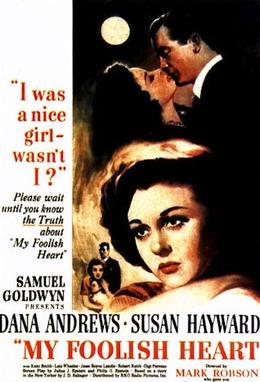From Wikipedia, the free encyclopedia
“My Foolish Heart” is a popular song and jazz standard that was published in 1949.
The song was introduced by the singer Martha Mears in the 1949 film of the same name. The song failed to escape critics’ general laceration of the film. Time wrote in its review that “nothing offsets the blight of such tear-splashed excesses as the bloop-bleep-bloop of a sentimental ballad on the sound track.” Nevertheless, the song was nominated for the Academy Award for Best Original Song in 1949 but lost out to “Baby, It’s Cold Outside” by Frank Loesser.
In addition to the numerous covers that have followed its official release, this song has entered fully what could be described as the collective unconscious. Artists such as Hozier have hinted at this song. The Irish singer has alluded the song in his own song called “Almost” published through the release of his sophomore album, Wasteland, Baby!, the lyrics being: “Be still “My Foolish Heart”/Don’t ruin this on me”.
Cover versions
- The song was also a popular success, with two recordings of the song listed among the top 30 on the Billboard charts in 1950. Gordon Jenkins‘s recording of “My Foolish Heart”,
- Sandy Evans, vocal, reached the Top Ten on the charts.
- However, Billy Eckstine‘s version became a million-seller, spending 19 weeks on the charts and peaking at number 6.
- Other successful versions in 1950 were by Mindy Carson, Margaret Whiting, Richard Hayes and by Hugo Winterhalter.
- Bing Crosby debuted his version on radio on The Bing Crosby – Chesterfield Show, broadcast Wednesday March 8, 1950.
- Roberta Flack on her 1991 album Set the Night to Music, issued as the A-side
- and B-side#B-side to the single “You Make Me Feel Brand New“
- Susannah McCorkle on her 1992 album I’ll Take Romance
Carly Simon
Connie Francis
| My Foolish Heart | |
|---|---|
| Theatrical release poster | |
| Directed by | Mark Robson |
| Produced by | Samuel Goldwyn |
| Written by | Julius J. Epstein Philip G. Epstein J.D. Salinger (short story) |
| Based on | Uncle Wiggily in Connecticut by J.D. Salinger |
| Starring | Dana Andrews Susan Hayward Kent Smith Lois Wheeler Robert Keith Jessie Royce Landis |
| Music by | Victor Young |
| Cinematography | Lee Garmes |
| Edited by | Daniel Mandell |
| Production company | Samuel Goldwyn Productions |
| Distributed by | RKO Radio Pictures |
| Release date | December 25, 1949 (Premiere-Los Angeles)January 21, 1950 (US) |
| Running time | 98 minutes |
| Country | United States |
| Language | English |
| Box office | $1,725,000 |
My Foolish Heart is a 1949 American film directed by Mark Robson, starring Dana Andrews and Susan Hayward. It relates the story of a woman’s reflections on the bad turns her life has taken.
Adapted from J.D. Salinger‘s 1948 short story “Uncle Wiggily in Connecticut“, this remains the only authorized film adaptation of Salinger’s work; the filmmakers’ infidelity to his story was responsible for precluding any other film versions of other Salinger works, including The Catcher in the Rye. The film inspired the Danish story Mit dumme hjerte by Victor Skaarup.
Indeed, “a good movie” would seem to have been implied by the background of those involved in the production, which included Oscar-winning actress Teresa Wright, and Casablanca screenwriters Julius J. Epstein and Philip G. Epstein. (Some years earlier, Salinger had referenced Casablanca in his 1944 short story “Both Parties Concerned“; one of its characters, upon learning his wife has left him, re-enacts the “Play it, Sam” scene from the film with an imaginary pianist.) However, the eventual film, renamed My Foolish Heart and with Susan Hayward replacing Wright at the last minute, was critically lambasted upon its release.
The New Yorker wrote that it was “full of soap-opera clichés”,[6] and, while allowing for “some well-written patches of wryly amusing dialogue”, Time rejected it as a “damp fable … the screenplay turns on all the emotional faucets of a Woman’s Home Companion serial”. Goldwyn biographer A. Scott Berg explained that “in the Epsteins’ version, more than had ever been suggested [in the original story] was shown, resulting in a ‘four handkerchief’ movie with a farfetched plot”. Berg even called the film a “bastardization”. Because of what Salinger’s agent later called “‘a terrible movie’ made in the 1950s (sic)” of one of his stories, the author never again relinquished control of his work to Hollywood filmmakers despite persistent interest in a screen adaptation of The Catcher in the Rye.
Despite a critical drubbing, the film was nominated for Academy Awards for Best Actress in a Leading Role (Susan Hayward) and Best Music, Song (Victor Young and Ned Washington for the title song, sung by Martha Mears), which has become a jazz standard. Although in recent years, the film’s standing has not improved (Christopher Durang called it “a soggy love story” in 1996). The film critic Andrew Sarris defended the film, although he admitted that as it was his deceased brother’s favorite film, so much of the movie’s appeal for him was nostalgic.
Watch the movie




































































Comments